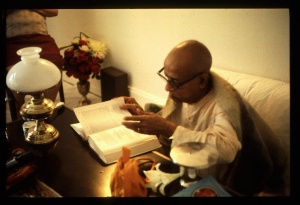CC Madhya 24.211: Difference between revisions
m (1 revision(s)) |
No edit summary |
||
| Line 1: | Line 1: | ||
{{ | [[Category:Sri Caitanya-caritamrta - Madhya-lila Chapter 24|C211]] | ||
<div style="float:left">'''[[Sri Caitanya-caritamrta|Śrī Caitanya-caritāmṛta]] - [[CC Madhya|Madhya-līlā]] - [[CC Madhya 24|Chapter 24: The Sixty-One Explanations of the Atmārāma Verse]]'''</div> | |||
<div style="float:right">[[File:Go-previous.png|link=CC Madhya 24.210|Madhya-līlā 24.210]] '''[[CC Madhya 24.210|Madhya-līlā 24.210]] - [[CC Madhya 24.212|Madhya-līlā 24.212]]''' [[File:Go-next.png|link=CC Madhya 24.212|Madhya-līlā 24.212]]</div> | |||
{{CompareVersions|CC|Madhya 24.211|CC 1975|CC 1996}} | |||
{{RandomImage}} | |||
==== TEXT 211 ==== | ==== TEXT 211 ==== | ||
<div | <div class="verse"> | ||
ei ūniśa artha karilu, āge śuna āra | :ei ūniśa artha karilu, āge śuna āra | ||
:'ātma'-śabde 'deha' kahe,—cāri artha tāra | |||
</div> | </div> | ||
| Line 12: | Line 16: | ||
==== SYNONYMS ==== | ==== SYNONYMS ==== | ||
<div | <div class="synonyms"> | ||
''ei''—these; ''ūniśa''—nineteen; ''artha''—meanings; ''karilu''—I have done; ''āge''—ahead; ''śuna''—hear; ''āra''—more; ''ātma-śabde''—by the word ''ātma''; ''deha''—the body; ''kahe''—is understood; ''cāri artha''—four meanings; ''tāra''—of that. | |||
</div> | </div> | ||
| Line 19: | Line 23: | ||
==== TRANSLATION ==== | ==== TRANSLATION ==== | ||
<div | <div class="translation"> | ||
"I have already explained nineteen different meanings. Now please hear further meanings. The word ‘ātma’ also refers to the body, and this can be taken in four ways. | |||
</div> | </div> | ||
| Line 26: | Line 30: | ||
==== PURPORT ==== | ==== PURPORT ==== | ||
<div | <div class="purport"> | ||
The four divisions of meanings of the word deha ( | The four divisions of meanings of the word ''deha'' ("body") are (1) ''aupādika-brahma-deha'', the material body considered as Brahman with designations (vide verse 212), (2) ''karma-niṣṭha yājñikera karma-deha'', the body engaged in ritualistic ceremonies of the Vedic injunctions (vide verse 214), (3) ''tapo-deha'', the body engaged in austerities and penances (vide verse 216), and (4) ''sarva-kāma-deha'', the body engaged for the satisfaction of all kinds of material desires (vide verse 218). | ||
</div> | </div> | ||
__NOTOC__ | |||
<div style="float:right; clear:both;">[[File:Go-previous.png|link=CC Madhya 24.210|Madhya-līlā 24.210]] '''[[CC Madhya 24.210|Madhya-līlā 24.210]] - [[CC Madhya 24.212|Madhya-līlā 24.212]]''' [[File:Go-next.png|link=CC Madhya 24.212|Madhya-līlā 24.212]]</div> | |||
__NOTOC__ | |||
__NOEDITSECTION__ | |||
Revision as of 03:02, 15 September 2021

A.C. Bhaktivedanta Swami Prabhupada
TEXT 211
- ei ūniśa artha karilu, āge śuna āra
- 'ātma'-śabde 'deha' kahe,—cāri artha tāra
SYNONYMS
ei—these; ūniśa—nineteen; artha—meanings; karilu—I have done; āge—ahead; śuna—hear; āra—more; ātma-śabde—by the word ātma; deha—the body; kahe—is understood; cāri artha—four meanings; tāra—of that.
TRANSLATION
"I have already explained nineteen different meanings. Now please hear further meanings. The word ‘ātma’ also refers to the body, and this can be taken in four ways.
PURPORT
The four divisions of meanings of the word deha ("body") are (1) aupādika-brahma-deha, the material body considered as Brahman with designations (vide verse 212), (2) karma-niṣṭha yājñikera karma-deha, the body engaged in ritualistic ceremonies of the Vedic injunctions (vide verse 214), (3) tapo-deha, the body engaged in austerities and penances (vide verse 216), and (4) sarva-kāma-deha, the body engaged for the satisfaction of all kinds of material desires (vide verse 218).